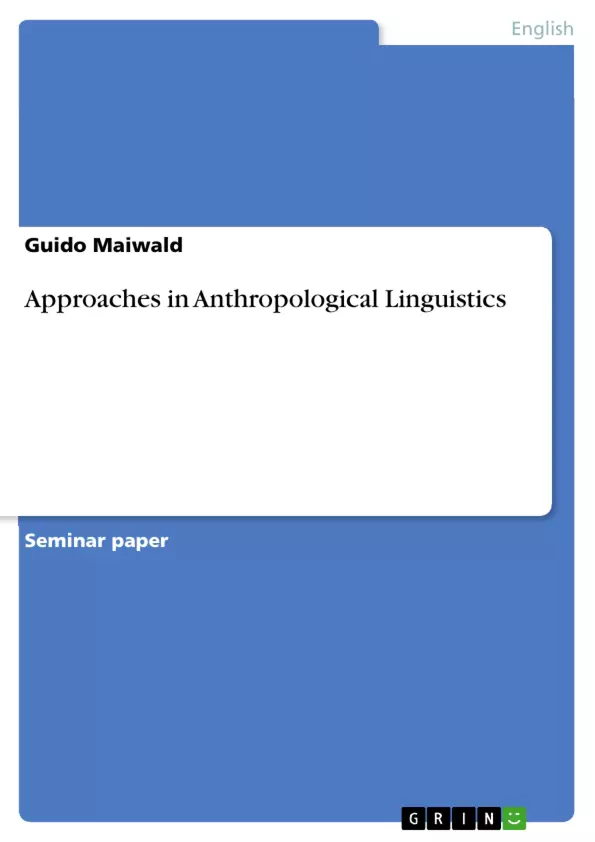Between Whorf's (+1941) and Sapir's (+1939) death and the reprinting of some of their writings in 1949 there was a hiatus in research that linked language to culture. In the 1950s and 1960s the Relativity Hypothesis played a crucial role in the growing research on the importance of language in human psychological and social functioning but there was just a small amount of empirical research.
Anthropological linguists refer to a "four field"-study of human beings that contains the following fields :
- Physical Anthropology
- Archeology (for investigation of historic and prehistoric languages and their cultural surroundings i.e. Indo-European Languages)
- Socio-Cultural Anthropology
- Linguistic Anthropology
First fieldworks were done in linguistically oriented case studies and on the investigation of single languages concerning their associations to culture or cultural modes of thought.
This work focuses on the invention of anthropological linguists, its predominant scholars and their theories und suppositions.
Table of Contents
- 1.0 Introduction
- 2. Different approaches within anthropological linguistics
- 2.1 Behaviourist Ethnolinguistics
- 2.2 Grammar as reflection of culture
- 2.3 The problem of language and thought
- 2.4 Typological approaches
- 2.4.1 Presuppositions
- 2.4.2 Linguistic universals
- 2.4.3 Selected Cases Approach
- 2.4.4 Cognitive implications of the typological patterning
- 3.0 The approaches of The Ethnography of Speaking
- 3.1 The relation between language/culture and language/thought according to ethnographers of speaking
- 3.2 Silversteins investigations
- 3.3 Further foci and fieldwork
- 3.4 Methodology
- 4.0 Ethnosemantics
- 4.1 Componential analysis
- 4.2 Folk Taxonomy
- 4.3 Artificial intelligence
Objectives and Key Themes
This work aims to explore various approaches within anthropological linguistics, examining the complex interplay between language, thought, and culture. It traces the development of different theoretical perspectives and methodologies used to investigate linguistic relativity and the impact of language on cultural understanding.
- The relationship between language and culture.
- Different theoretical approaches to anthropological linguistics (e.g., behaviorist ethnolinguistics, typological approaches, ethnography of speaking, ethnosemantics).
- The connection between language structure and cognitive processes.
- The role of language in shaping cultural worldview ("Weltanschauung").
- Methodological approaches to studying language in its cultural context.
Chapter Summaries
Chapter 1.0 Introduction: This chapter introduces the historical context of anthropological linguistics, highlighting the development of research linking language to culture, and outlines the key research areas of comparative psycholinguistics and anthropological linguistics.
Chapter 2. Different approaches within anthropological linguistics: This chapter explores several key approaches in anthropological linguistics, including behaviourist ethnolinguistics (Malinowski and Pike), the view of grammar as a reflection of culture (Dorothy D. Lee's work on Wintu), and the complex problem of language and thought (Hoijer's work on Navajo). It also delves into typological approaches, examining linguistic universals and the selected cases approach.
Chapter 3.0 The approaches of The Ethnography of Speaking: This chapter focuses on the ethnography of speaking, its objectives, and its methodologies. It explores Hymes' contribution to the field, highlighting his work on the relationship between language use and cultural values.
Chapter 4.0 Ethnosemantics: This chapter explores the field of ethnosemantics, analyzing how the meaning of words and lexicon reflects cultural understanding and cognition. It discusses componential analysis, folk taxonomies, and the contributions of artificial intelligence research to the field.
Keywords
Anthropological linguistics, linguistic relativity, language and culture, language and thought, ethnography of speaking, ethnosemantics, componential analysis, folk taxonomy, typological approaches, linguistic universals, cultural worldview, cognitive processes, methodology, case studies.
Frequently Asked Questions
What is Anthropological Linguistics?
It is a field of study that investigates the relationship between language, thought, and culture, often using fieldwork and case studies to understand how language shapes a cultural worldview.
What are the four fields of anthropology?
The four fields are Physical Anthropology, Archeology, Socio-Cultural Anthropology, and Linguistic Anthropology.
What is the Relativity Hypothesis?
Also known as the Sapir-Whorf hypothesis, it suggests that the structure of a language influences its speakers' cognition and world perception.
What is "The Ethnography of Speaking"?
An approach pioneered by Dell Hymes that focuses on how language is actually used in social contexts and how these patterns reflect cultural values.
What is Ethnosemantics?
Ethnosemantics analyzes how the meaning of words and classifications (like folk taxonomies) reflect cultural understanding and cognitive processes.
What is Componential Analysis?
A methodology used in ethnosemantics to break down the meaning of words into basic distinctive features to understand cultural categorization.
- Arbeit zitieren
- MA Guido Maiwald (Autor:in), 1999, Approaches in Anthropological Linguistics, München, GRIN Verlag, https://www.grin.com/document/125171



